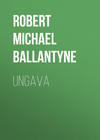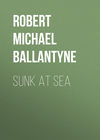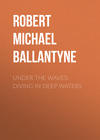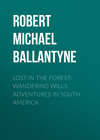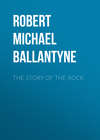Kitabı oku: «Ungava», sayfa 8
Chapter Twelve.
A new scene—The Esquimau—Deer-slaying—Enemies in the bush
Turn we now to another, a more distant, and a wilder scene. Near the bleak shores of Hudson’s Straits there flows a river which forms an outlet to the superfluous waters of the almost unknown territory lying between the uninhabited parts of Labrador and that tract of desert land which borders Hudson’s Bay on the east, and is known to the fur-traders by the appellation of East Main. This river is called the Caniapuscaw, and discharges itself into Ungava Bay.
The scene to which we would turn the reader’s attention is upwards of twenty miles from the mouth of this river, at a particular bend, where the stream spreads itself out into a sheet of water almost worthy of being called a lake, and just below which two bold cliffs shut out the seaward view, and cause an abrupt narrowing of the river. The scene is peculiar, and surpassingly grand. On each side of the stream majestic mountains raise their bald and rugged peaks almost into the clouds. Little herbage grows on the more exposed places, and nothing, save here and there a stunted and weather-worn pine, breaks the sharp outline of the cliffs. But in the gorges and dark ravines—for there are no valleys—clumps of small-sized spruce—fir and larch trees throw a softness over some of the details of a spot whose general aspect is one of sterility. The mountains rise in a succession of irregular steps or terraces, whose faces are so precipitous that they cannot be ascended. To accomplish the feat of scaling the mountain-tops it would be necessary to clamber up a ravine until the first terrace should be gained, then, walking along that, ascend the next ravine, and so on. At the upper end of the lake (as we shall hereafter call this wide part of the river) lies a low island, fringed with a scanty growth of willows; and not far from this, on the eastern bank of the river, lies a small patch of level sand. This spot is somewhat peculiar, inasmuch as it is backed by a low platform of rock, whose surface is smooth as a table. At the foot of this rock bubbles a little spring, which, meandering through a tangled spot of stunted shrubbery ere it mingles with the sand, gives unusual green-ness and vitality to the surrounding herbage. On the edge of this rocky platform sat the figure of a man.
It was evening. The declining sun shot its last few rays over the brow of the opposite mountains, and bathed him in mellow light, as he sat apparently contemplating the scene before him. The man’s costume bespoke him a native of the savage region in the midst of which he seemed the only human being. But although an Esquimau, he exhibited several physical peculiarities not commonly supposed to belong to that people. To an altitude of six feet three he added a breadth of shoulder and expansion of chest seldom equalled among men of more highly-favoured climes; and his real bulk being very greatly increased by his costume, he appeared to be a very giant—no unfitting tenant of such giant scenery. The said costume consisted of an extremely loose coat or shirt of deerskin, having the hair outside, and a capacious hood, which usually hung down behind, but covered his head at this time, in order to protect it from a sharp north-west breeze that whirled among the gullies of the mountains, and surging down their sides, darkened the surface of the water. A pair of long sealskin boots encased his limbs from foot to thigh; and a little wallet or bag of sealskin, with the hair outside, hung from his shoulders. Simple although this costume was, it had a bulky rotundity of appearance that harmonised well with the giant’s frank, good-humoured countenance, which was manly, firm, and massive, besides being rosy, oily, and fat. In the latter peculiarity he partook of the well-known characteristic of his tribe; but the effeminacy in appearance that is produced by a round, fat face was done away in the case of our giant by a remarkably black though as yet downy moustache and beard, of a length suitable to twenty-three winters. His hair was long, straight, and black, besides being uncommonly glossy—an effect attributable to the prevalence of whale-oil in these regions. On the forehead the locks were cut short, so as to afford free scope to his black eyes and sturdy-looking nose. By his side lay a long hunting spear, and a double-bladed paddle, fully fifteen feet long; which latter belonged to a kayak, or Esquimau canoe, that lay on the sand close to the water’s edge. Sitting there, motionless as the rocks around him, the giant looked like a colossal statue of an Esquimau. He was no figure of stone, however, but a veritable human being, as was proved by his starting suddenly from his reverie and hastening towards the spring before mentioned, at which he stooped and drank rapidly, like one who had to make up for lost time.
After a few hurried gulps, the man strode towards his canoe; but as he went his restless eye became fixed on the branching antlers of a deer, that were tossed in the air on the summit of a neighbouring cliff. Like one who is suddenly paralysed, the Esquimau stood transfixed in the attitude in which he had been arrested. He did not even seem to breathe, as the antlers moved to and fro, clearly defined against the blue sky. At length they disappeared, and the animal to which they belonged slowly descended a ravine towards the river. Then, as if set free from a spell, the man glided into his kayak, and swept rapidly but noiselessly behind a projecting point of rock, where he waited patiently till the deer took to the water. He had not long to wait, however, for in a few minutes afterwards the deer, followed by several companions, walked out upon the patch of sand, snuffed the air once or twice, and entered the stream with the intention of crossing.
But there was an enemy near whom they little dreamed of—not an enemy who would dash excitedly into the midst of them, or awaken the thunders of the place with his noisy gun, but a foe who could patiently bide his time, and take cool and quiet advantage of it when it came. When the deer had proceeded about a hundred yards into the river, the Esquimau dipped his paddle twice, and the narrow, sharp-pointed canoe, which, at a short distance, seemed little more than a floating plank, darted through the water and ranged alongside of the startled animals. The fattest of the herd was separated from its fellows and driven towards the shore from which it had started, while the others struggled across the river. Once or twice the separated deer endeavoured to turn to rejoin its comrades—an attempt which was frustrated by the Esquimau, who could paddle infinitely faster over the water in his skin canoe than the deer could swim. As they neared the shore, the giant cast on it one or two glances, and having made up his mind as to the most convenient spot for landing, he urged the point of his canoe between the antlers of the deer, and steered it in this manner to the sand-bank. The deer, thus directed, had no resource but to land where its persecutor chose; but no sooner did its foot touch ground, than it sprang convulsively forward in the vain hope to escape. The same instant its captor’s canoe shot beside it. Grasping the long lance before mentioned in his hand, he placed its glittering point on the deer’s side, tickled it slowly to ascertain that it was between two ribs, and, with a quick thrust, stabbed it to the heart. A convulsive shudder, as the deer’s head sank in the stream, proved that, though cold-blooded in appearance, the action was more effective and less cruel than many other more approved methods of killing game.
Our Esquimau thought neither of the method of slaying his deer nor of man’s opinion regarding it. His sole object was to procure supper, having tasted nothing since early morning; and the manner in which he ate showed at once the strength of his appetite and his total indifference to cookery, for he ate it raw. There was a certain appearance of haste in all his actions which, however, seemed unaccountable, considering the peaceful nature of the vast solitudes around him. Scarcely had he cut off and devoured a portion of the deer than he hastened again to his canoe, and darted like an arrow from the shore. This is no exaggerated simile. The long, thin, sharp Esquimau kayak is highly suggestive of an arrow in its form, and much more so in its extraordinary speed. It consists of an extremely light framework of wood covered with sealskin parchment, which is stretched upon it all over as tight as a drum. The top of the canoe being covered as well as the bottom, it is thus, as it were, decked; and a small hole in the middle of this deck admits its occupant. The kayak can only hold one person. The paddle, as already said, is a long pole with a blade at each end. It is dipped alternately on each side, and is used not only to propel the kayak, but to prevent it from upsetting. Indeed, so liable is it to upset that nothing but the wonderful adroitness of its occupant prevents it from doing so with every swing of his body.
Quick, however, though the kayak sped over the rippling wave, it could not have escaped the messenger of death that seemed about to be dispatched after it by a dark-skinned, red-painted Indian, who, at the moment the vessel left the shore, leapt from behind a rocky point, and, levelling a long gun, took a steady aim at the unconscious Esquimau. A little puff of powder answered to the click of the lock, as the gun missed fire. With an exclamation of anger the savage seized his powder-horn to reprime, when a rude grasp was laid on his shoulder, and another Indian, who, from the eagle feather in his hair, and his general bearing, appeared to be a chief, exclaimed—
“Fool! you have the impatience of a woman, and you have not yet shown that you have the heart of a man. Would the scalp of yon Eater-of-raw-flesh pay us for coming so far from our hunting-grounds? If your gun had spoken among these mountains, we would have found the empty wigwams of his people, instead of fringing our belts with their scalps.”
With a frown of anger the chief turned on his heel and retraced his steps into the ravine from which he had emerged, followed by his abashed and silent companion.
Meanwhile the Esquimau, ignorant of the fate from which he had just escaped, continued to ply his paddle with right good will. The little craft, obedient to the powerful impulse, combined as it was with the current of the ebb-tide, flew rather than floated toward the narrows, through which it passed, and opened up a view of the ice-encumbered waters of Ungava Bay. Directing his course along the western shores of the river, the Esquimau speedily reached the coast at a point where several low, rough-built summer huts clustered near the shore. Here he ran his kayak into a little creek, and, having lifted it beyond tide mark, betook himself to his dwelling.
Chapter Thirteen.
Savage love—A wife purchased—The attack—The flight—The escape—The wounded man
Scarcely had the stout Esquimau proceeded a few steps along the shore, when he was met by a young girl who laid her hand on his arm. Taking her gently by the shoulders, he drew her towards him and kissed her on both cheeks—an action which caused her to blush deeply as, with a half smile half frown on her face, she pushed him away.
Love is the same all the world over, whether it glows beneath the broad-cloth and spotless linen of a civilised gentleman, or under the deerskin coat of a savage. And its expression, we suspect, is somewhat similar everywhere. The coy repulse of pretended displeasure came as naturally from our plump little arctic heroine as it could have done from the most civilised flirt, and was treated with well-simulated contrition by our arctic giant, as they walked slowly towards the huts. But the Esquimau had other matters than love in his head just then, and the girl’s face assumed a grave and somewhat anxious look as he continued to whisper in her ear.
At the little hamlet they separated, and the maiden went to her grandfather’s abode; while her lover, lifting the skin-curtain door of a rudely-constructed hut, entered his own humble dwelling. The room was empty, and its owner did not seem as if he meant to cheer it with his presence long. In one corner lay a pile of miscellaneous articles, which he removed, and, taking the tusk of a walrus which lay near his hand, began to dig with it in the sand. In a few seconds it struck a hard substance, and the Esquimau, putting his hand into the hole, drew forth a glittering axe, upon which he gazed with supreme satisfaction.
Now be it known to you, reader, that among the Esquimaux of the frozen north iron is regarded with about as much delight as gold is by ourselves. And the reason is simple enough. These poor people live entirely upon the produce of the chase. Polar bears, seals, walruses, and whales are their staff of life. To procure these animals, spears are necessary; to skin and cut them up, knives are needful. But bone and stone make sorry knives and spears; so that, when a bit of iron, no matter how poor its quality or small its size, can be obtained, it is looked on as the most valuable of possessions; and the ingenuity displayed by Esquimaux in fashioning the rudest piece of metal into the most useful of implements is truly astonishing, proving, in the most satisfactory way, that necessity is indeed the mother of invention. The precious metal is obtained in two ways: by the discovery of a wreck, which is extremely rare; and by barter with those tribes which sometimes visit the Moravian settlements of Labrador. But neither source is very productive. Even a nail is treasured as a blessing, while an axe is a fortune! When our giant, therefore, drew forth the shining implement, and gazed with delight at its keen edge, he experienced as great satisfaction as a miser does when gloating over his banker’s book!
Having satisfied himself that the axe was free from all approximation to rust, he stuck it into a belt of raw hide, which he put on for the express purpose of sustaining it, as Esquimaux do not generally wear belts. He then sallied forth, and walked with the air of a man who wears the grand cross of the Legion of Honour. As he went to the hut in which lived the oldest man of the tribe, the shade of anxiety, which had clouded his brow more than once during the day, again rested on his face. On entering, he observed the old Esquimau listening with anxious countenance to the young girl whom we have already introduced to the reader.
Now this girl—Aneetka by name—was by no means an angel in Esquimau habiliments. Among civilised folk probably she would not have been deemed even pretty. Nevertheless, in the eyes of her lover she was most decidedly beautiful, and round, and fat, and rosy, and young, awkward, and comfortable! And the giant loved her—never so strongly, perhaps, as when he saw her striving to allay the fears of her old grandfather. But this same grandfather was obstinate. He wanted her to become the wife of an Esquimau who lived far to the westward, and who once had dealings with the fur-traders, and from whom he expected to derive considerable advantages and gifts of bits of hoop-iron and nails. But she wanted to become the giant’s wife; so there the matter stood.
“The spirits o’ the wind and sea protect us, and may the god o’ the mist cover us!” said the old man, as the young Esquimau sat down on a dead seal beside him. “Is it true that you saw the men of fire?”
This was, of course, said in the language of the Esquimaux, and we render it as literally as possible.
“Yes, it is true,” replied the young man. “I saw them at the rapid water in Caniapuscaw, and I took kayak to bring the news.”
Various exclamations of mingled surprise and anger escaped from the compressed lips of several stalwart natives, who had crowded into the tent on hearing of the arrival of their comrade.
“Yes,” continued the young man, “we must go away this night. They had fire-tubes, and there were thirty men. We have only ten.”
Again a murmur ran through the listeners, but no one spoke for a few seconds.
“Did they see you?” asked the old man anxiously.
“No. I came on them suddenly, when I was chasing deer, and almost ran into their camp; but I saw, and fell in the grass. I thought the chief raised his head quickly when I fell; but he looked down again, and I crawled away.”
In this the young Esquimau was mistaken. He knew little of the craft and the quickness of the Red Indian, and easily fell into the snare of his savage enemy, who, having been momentarily startled by the sudden sound of the Esquimau approach, had endeavoured to throw him off his guard, by pretending that although he heard the sound he thought nothing of it. But no sooner had the Esquimau retired than he was closely followed and watched by the whole party. They could have easily shot him, but refrained from doing so, that he might unwittingly be their guide to the habitations of his people. The rapid flight of his kayak distanced his pursuers at first, but they made up for this during an hour or two in the night, when the tired Esquimau allowed himself a short season of repose to recruit his energies for the following day’s journey. During this period the Indians shot far ahead of him, and when he arrived at the coast next day they were not much in the rear.
“And now, old man,” said our young Esquimau, “it is time that I should have my wife. If the Allat1 come here to-night, as I know they will, I want to have a right to defend her, and carry her away when we flee. Are you willing?”
The young giant said this with a degree of roughness and decision that at any other time would have made the obstinate old grandfather refuse point blank; but as there was every probability of having to flee for his life ere the break of another day, and as his old heart trembled within him at the thought of the dreaded guns of the Indians, he merely shook his head and pondered a little.
“What will you give me?” he said, looking up.
The young man answered by drawing the axe from his belt and laying it on the ground before him. The old man’s eyes glistened with pleasure as he surveyed the costly gift.
“Good; that will do. Take her and go.”
A second bidding was not needed. The young man arose hastily, took his blushing bride by the hand, and led her from the tent of her grandfather towards his own. Here she set to work instantly to assist her husband in hurriedly packing up their goods and chattels; and, immediately afterwards, the little village became a perfect Babel of confusion, as the alarmed inhabitants, on learning the threatened danger, prepared for instant flight. In less than an hour the most of them were ready. The men launched their kayaks, while the women, having loaded their oomiaks with their goods, tossed their dogs and children on the top of them.
The oomiak, or women’s boat, is quite a different affair from the kayak, in which the men travel singly. It is usually made large and capacious, in order to hold the entire household of the Esquimau. Like the kayak it is made of skin, but has no covering above, and is propelled by means of short single-bladed paddles, which are worked by the women, upon whom devolves the entire care and management of the oomiak. It is a clumsy affair to look at, but, like the boats of savages generally, it is uncommonly useful and a good sea-boat.
While the Esquimaux were busied in completing their arrangements, one of the dogs rushed towards the bushes that lined the shore just behind the village, and barked vociferously. Instantly it was joined by the whole pack, and the Esquimaux, who, ever since they had heard of the proximity of their Indian foes, were in a state of the utmost trepidation, made a general rush towards their canoes. Before they reached them, however, a volley of musketry was fired from the bushes, and three of their number—a man and two women—filled the air with their death-shriek, as they fell dead upon the beach; while the Indians sprang from their concealment, and, brandishing their knives and tomahawks, rushed with a fearful yell upon the terror-stricken Esquimaux.
Shrill and terrible though the Indian war-cry is proverbially known to be, it was excelled in appalling wildness by the shriek which arose from the Esquimaux, as they hurried tumultuously into their canoes and put off to sea. These poor creatures were naturally brave—much more so, indeed, than their assailants; but the murderous effects of the terrible gun caused the sternest brow among them to blanch and the stoutest heart to quail. The arrow and the spear, however rapid, could be avoided, if observed in time; but this dreaded implement of destruction was so mysterious to them, and its death-dealing bullet so quick, and the smoke, the fire, and the loud report so awful, that they shuddered even when they thought of it. No wonder, then, that they uttered a despairing cry when it actually sounded in their ears.
When the dogs first gave tongue, our tall Esquimau was alone in his hut, having just sent his wife down with a bundle to the oomiak. When the volley rang in his ears, he rushed towards the beach, supposing that she was there before him. This was not the case, however. Aneetka had gone towards her grandfather’s hut, and when the Indians fired she rushed in to assist him to fly. But the old man was already gone. Turning instantly, she sprang nimbly towards the shore. At that moment a single shot was fired, and she saw her husband stumble forward and fall headlong to the earth, where he lay motionless. Her first impulse was to run towards the body and throw herself upon it; but this intention was effectually checked by a strong, dark-skinned arm which encircled her waist, and, despite her cries and struggles, bore her away into the bushes. Her captor was the Indian whose gun once before on that day had been levelled at her lover’s head.
When the young Esquimau fell, as already related, he was so close to the water that he stumbled into it, and, fortunately, not a yard distant from an oomiak which the women were frantically thrusting into the sea. They had no time to lift so heavy a weight on board, but, as the light craft darted from the shore, an old woman, who had often received kind attentions from the good-natured youth, leant over the stern and seized him by the hair. In this manner he was dragged through the water until they were out of gun-shot, when he was lifted inside and laid beside the dogs and children.
Meanwhile the Indians had rushed into the water up to their middle, in the hope of catching the last of the little fleet, but without success. Mad with disappointed rage, they waded back to the shore, and, standing in a line along the edge of the waves, reloaded their guns with the utmost rapidity. The poor Esquimaux knew well what would follow, and strained every nerve to increase their distance. Once more the guns belched forth their leaden shower, which went skipping over the water towards the flotilla. Only one kayak was hit by the discharge. It was that of the old grandfather already mentioned. The ball ripped up the side of the canoe, which filled and upset, and the poor old man would certainly have been drowned but for the opportune coming up of the oomiak containing his wounded grandson. The old woman who had already saved the life of the young giant of the tribe, again put forth her skinny hand and grasped the patriarch, who was soon hauled on board in safety. A few minutes more placed the whole party out of danger.
In the meantime, the Indians, furious with disappointment, scalped the three dead bodies and tossed them into the sea; after which they went into the huts in order to collect all the valuables that might have been left behind. Very little, however, was to be found, as the entire property of an Esquimau is not worth much to a red man. The most useful thing they laid hands on was the axe which the old grandfather had left behind in his hurried flight. Having taken all they could carry, the savages destroyed the rest; and then, setting fire to the village, they returned to the bush. Here a fire was made, and a council of war held.
When the Indian who had captured the Esquimau girl led her forward towards the fire, there was a general yell of indignation. Tomahawks were grasped, and more than one knife was unsheathed. But the chief commanded silence.
“What does White Heart mean to do with the Eater-of-raw-flesh?” he inquired, turning to the young man.
“He will take her to the hunting-grounds of the Crees.”
“That cannot be,” said the chief. “The girl must die, and White Heart must kill her.”
The young man made no reply.
“If,” continued the chief sarcastically, “White Heart is afraid to see blood on his knife, another warrior will show him how to do it!”
As he spoke, a dark-visaged savage drew his scalping-knife, and, with one stride, stood beside the trembling girl, who, during the consultation of the savages, had stood silently beside her captor listening intently to the words which she did not comprehend.
Seizing her by the shoulder, the savage plunged his knife at her bosom; but, ere the keen point reached it, the arm was caught by the young Indian, and the scowling savage was hurled violently back. With dilated eye and expanded nostril, the young man, not deigning to bestow a glance upon his fallen comrade, turned to his chief and said—
“Did not I take her? The girl is mine. I will carry her to my tent and make her my wife.”
“Be it so,” replied the chief abruptly. Then turning to his followers, he gave orders to start immediately.
In a few minutes all was ready. The chief led the way into the bush. The Esquimau girl and her captor followed; and the whole band, silently and in single file, commenced to retrace their steps to the far distant hunting-grounds of the Cree Indians.
